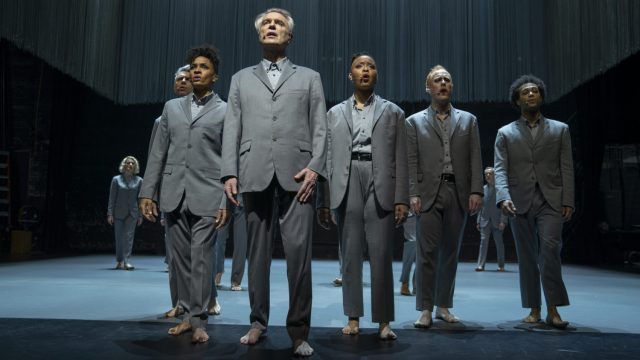David Byrne’s American Utopia: Under the Water, Carry the Water, by David Bax

David Byrne is one spry old man. In his late 60s, he still jumps and dances throughout Spike Lee’s filmed document of Byrne’s Broadway show, American Utopia. In these ways, he seems every bit the twentysomething iconoclast whose quiet but spiky electric guitar provided a counterpoint to the punk rock chainsaws of the CBGB heyday. In other ways, though, with his full head of wavy gray hair and his 40 plus years as a vital artist, he’s very much the elder statesman, someone younger generations continue to look to for guidance through the vast wilderness of the creative life. In American Utopia‘s opening number, where he holds and sings about a model of a human brain, he even seems like a gentle lecturer, some kind of weirder Bill Nye. His physical comportment and the timbre of his plaintive, nasally voice command plenty of attention on their own (as an aside, why doesn’t he get cast in movies more often?). But, with his vision and terrific songwriting, Byrne’s arresting presence is only the leaping off point for the greatness of the film.
American Utopia is the name of Byrne’s 2018 solo album. The stage show–full name: David Byrne’s American Utopia–is a performance of songs from that album as well as a number of other favorites from his time as a member of Talking Heads, choreographed and structured around a message of hope, positivity and the drive for change in dark times. Byrne speaks in between most numbers, sometimes reflecting on larger topics like the cerebral connections that disappear from our brains as we age and sometimes directly commenting on and contextualizing his often abstruse songs.
In the first such spoken segment, he utters the phrase, “How do I work this?”, a classic lyric from the song “Once in a Lifetime” that lets the audience know that, conceptual ambitions aside, American Utopia will also be a treat for the Talking Heads faithful. His unmoored band, running around the stage with drums and keyboards and such strapped to their chests, does most of the musicianship but the first time Byrne picks up his guitar–to play “I Zimbra”–is a thrill for the art-rock geeks.
Still, this isn’t just a concert. American Utopia‘s coolly minimalist stagecraft and simple costuming–everyone wears identical gray suits and shirts with no ties–suggest an almost obsessive-compulsive tendency toward clean separation. But as the show goes on, the performers come together, touching and swinging around each other. Even the three walls of the set are made of beads, illusory and permeable. We see Byrne’s dream of a less rigid society develop before our eyes. And Lee’s camera lets us see it close-up, enjoying details like the barefoot Byrne occasionally wriggling his toes that we might have missed from the theater seats and even venturing into the audience (where the older crowd can’t exactly get down the way the one in Jonathan Demme’s Stop Making Sense does).
In one of his between-song speeches, for the recent “Everybody’s Coming to My House,” he refers to the protagonist of the song as “the singer,” pointedly not claiming to be the character even though the song is sung in the first person. There’s always been an ironic detachment, not just to Byrne’s music, but to his entire worldview. His lone nonfiction feature as a director, True Stories, has some of the same bemused outsider’s adoration of American that you can see here.
Except that, now, Byrne isn’t an outsider. Born in Scotland and raised partially in Canada, he became an American citizen in 2012 and has been a vocal advocate for the importance of voting. In American Utopia, he mixes commentary like a speech about dadaism as a response to rising nationalism and fascism, while never drawing explicit parallels to the present, with blatantly topical references to people like Colin Kaepernick and a stirring cover of Janelle Monae’s “Hell You Talmbout.” The exquisite blend of artistry, humanity and fervent politics makes American Utopia as much a David Byrne movie as a Spike Lee one.




























